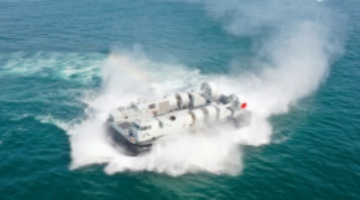By Ge Hongliang
葛红亮
Tension reemerged in waters near Xianbin Jiao and Ren'ai Jiao on August 19, which was unilaterally caused by the Philippines as it sent its coast guard vessels MRRV-4410 and MMRV-4411 to illegally intrude into waters near Xianbin Jiao of China's Nansha Qundao. CCG adopted restrictive measures on the intruding vessels in accordance with lawand regulations.
8月19日,仙宾礁、仁爱礁附近海域再现紧张态势。此次紧张态势完全由菲律宾单方面挑起。菲律宾4410、4411号海警船未经中国政府允许,非法闯入中国南沙群岛仙宾礁邻近海域,中国海警依法对菲船只采取管控措施。
The MRRV-4410 ignored repeated stern warnings from the Chinese side and intentionally rammed into the CCG vessel that was conducting normal rights-safeguarding and law enforcement activities, which was unprofessional and dangerous, resulting in a minor collision. After its attempt to illegally intrude into waters adjacent to Xianbin Jiao was blocked, it again illegally intruded into waters adjacent to Ren'ai Jiao of China's Nansha Qundao, disregarding repeated warnings and route restrictions by the Chinese side.
菲船只无视中方多次严正警告,以不专业、危险方式,故意冲撞中方正常维权执法的海警艇,导致发生擦碰。菲海警船在仙宾礁邻近海域受阻后,不顾中方反复警告、航路管制,再次非法冲闯中国南沙群岛仁爱礁附近海域。
The provocation came just one month and a half after the 9th meeting of the China-Philippines bilateral consultation mechanism (BCM) on the South China Sea issue, less than a month after the two countries agreed on the interim arrangements to keep the Ren'ai Jiao situation under control, and just 20 days after the two foreign ministers' meeting in Vientiane.
从时间上看,此次挑衅的发生,距离中菲举行南海问题双边磋商机制(BCM)第九次会议一个半月,距离中菲达成关于管控仁爱礁局势临时性安排还不到一个月,距离中菲两国外长万象会晤刚刚过去20天。
At the 9th BCM meeting, both Beijing and Manila agreed that maintaining peace and stability in the South China Sea is in the interests of both parties and is the common goal of all countries in the region. They agreed to manage and control their divergences through dialogue and consultation.
在中菲南海问题双边磋商机制第九次会议上,双方认为维护南海和平稳定符合中菲双方利益,也是地区国家的共同目标,同意继续通过保持对话协商,管控矛盾分歧。
During the meeting in Vientiane, Philippine Secretary of Foreign Affairs Enrique Manalo expressed the willingness to mitigate the tension through dialogue and consultation and handle divergences in a constructive way amid the difficulties and challenges arising from maritime disputes. He said Manila is ready to implement the bilateral consensus on managing and controlling the maritime situation.
在两国外长的会晤中,菲律宾外长马纳罗表示,尽管双方因海上问题面临困难和挑战,但菲方愿通过对话协商缓和局势,建设性处理分歧,同时他更明确表示,菲律宾愿落实好中菲管控海上局势等共识。
With the latest provocation, the Philippines is once again going back on its words, which not only erodes the China-Philippines dialogue and mutual trust on the South China Sea, but also worsens the situation on the sea and seriously sabotages regional security, peace, and stability.
这一局势的发生再次表明,菲律宾在此前撕毁“君子协议”之后,如今又现言行反复,这在显著损害中菲南海对话互信的同时,也影响了南海局势,严重破坏地区安全与和平稳定。
At the moment, China and ASEAN countries are making combined efforts to comprehensively and effectively implement the Declaration on the Conduct of Parties in the South China Sea (DoC) and, on that basis, promote equal political consultation on the Code of Conduct in the South China Sea (CoC), in the joint endeavor to strengthen relevant dialogues and keep the region secure and peaceful. In recent years, China, Vietnam, Malaysia and some other countries have played an exemplary role in well managing their divergences and maintaining stability in the South China Sea.
当前,中国与东盟国家共同努力推动《南海各方行为宣言》的全面有效落实,并在此基础上致力于推进“南海行为准则”的平等政治磋商,共同加强南海对话和一道维护南海地区安全与和平。近年来,中国与越南、马来西亚等国在管控南海分歧与共同维护南海局势稳定方面作出了表率。
On December 13, 2023, China and Vietnam issued the Joint Statement on Further Deepening and Elevating the Comprehensive Strategic Cooperative Partnership and Building a China-Vietnam Community with a Shared Future that Carries Strategic Significance. On June 20, 2024, China and Malaysia issued the Joint Statement on Deepening the Comprehensive Strategic Partnership towards the China-Malaysia Community with a Shared Future.
2023年12月13日,中越共同发布《关于进一步深化和提升全面战略合作伙伴关系、构建具有战略意义的中越命运共同体的联合声明》。2024年6月20日,中马共同发表《关于深化提升全面战略伙伴关系、共建中马命运共同体的联合声明》。
Now the Philippines' duplicity has seriously challenged the interests and collective security of regional countries. China will continue to take resolute countermeasures in accordance with law, and other ASEAN members need to declare their positions and take action to maintain the solemnity and authority of the DoC.
如今,菲律宾言行一再出尔反尔,严重挑战了地区国家的利益和整体性安全。对此,中国将继续依法采取坚决有力的举措,而其他东盟国家也需在维护《南海各方行为宣言》严肃性方面有所言有所行。
The South China Sea issue is just part of a much bigger picture of the China-Philippines relations, but Manila's irresponsible actions and repeated provocations have put bilateral relations in a jam. When meeting with his Philippine counterpart, Chinese Foreign Minister Wang Yi attributed the current tensions and challenges in bilateral ties to the Philippines' repeated violations of bilateral consensus and its own commitments, ongoing maritime infringements, and amplified media hype.
南海问题并非中菲关系的全部,但菲律宾在南海问题上不负责任的“表演”及三番五次的挑衅,已经让中菲关系陷入严重困难的局面。而就此,诚如王毅外长在会见马纳罗时所言,“当前中菲关系面临严重困难挑战,根源在于菲律宾一再违背双方共识和自身承诺,不断推进海上侵权,并放大舆论炒作”。
To well manage and control their divergences and maintain regional stability, the Chinese side urges the Philippine side to fulfill its commitment, not repeatedly eat its own words, backpedal, or create problems. As the China-Philippines relations are at a crossroads, Manila should learn something from its exchanges with China in recent years and change course before it's too late. The two sides must work together to comprehensively and effectively deliver the series of consensus on the South China Sea reached by the two heads of state in January 2023. That is the precondition for bilateral dialogue and for their ties to go back to the correct track.
对于中菲管控南海分歧与维护南海稳定,中方明确指出,“关键是菲律宾要履行承诺,不要再朝令夕改、出尔反尔,不要再反复倒退、节外生枝”。现在,中菲关系已经站在了十字路口,而中菲交往近年来正反两方面经验表明,菲律宾应悬崖勒马。双方须共同推动两国元首2023年1月达成的一系列涉南海共识得到全面有效落实,这将构成中菲南海对话和双边关系重返正轨的根本。
(The author is associate dean of the College of ASEAN Studies, Guangxi Minzu University)
(作者是广西民族大学东盟学院副院长)
Editor's note: Originally published on huanqiu.com, this article is translated from Chinese into English and edited by the China Military Online. The information and opinions in this article do not necessarily reflect the views of eng.chinamil.com.cn.









